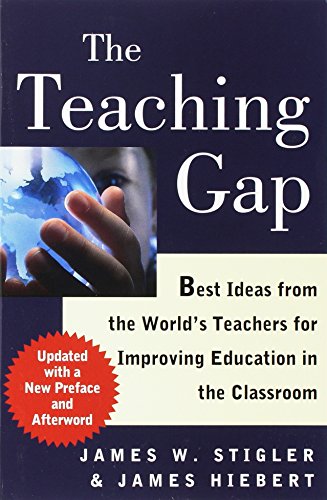- Features
- Description
- Similar Items
Binding:
PaperbackBrand:
Free PressEAN:
9781439143131Label:
Free PressManufacturer:
Free PressModel:
Size:
Warranty:
In a time when educators and politicians in the United States are fumbling for a fix--from vouchers to smaller class sizes--for ailing public schools, it's refreshing to read the more sophisticated take on what can be done to improve American education found in The Teaching Gap, a straightforward analysis of approaches towards teaching around the world. James W. Stigler, a UCLA psychology professor, and James Hiebert, an education professor at the University of Delaware, argue that America's culture of teaching needs to be changed before we see any real change in student achievement--and they're not simply talking about higher pay and more respect.
The bulk of The Teaching Gap examines the cultural differences among teaching methods, with detailed accounts of video observations of eighth-grade math teachers that were part of the Third International Mathematics and Science Study, or TIMSS (which Stigler directed). American teachers in the videos tend to emphasize terms and procedures, thinking of math as a set of tedious skills. They try to interest students with praise and real-life problems. In contrast, Japanese teachers are more likely to emphasize ideas, expecting the concepts alone to stir students' natural curiosity. They weave together lessons that have a distinct beginning, middle, and end. Teachers in the other countries are more likely to share lessons on what works in the classroom and receive more sophisticated training, the authors found. Only seven out of 41 nations scored lower than the U.S. in TIMSS, placing American eighth-graders with those from Cyprus, Portugal, South Africa, Kuwait, Iran, and Colombia. Without falling into teacher-bashing mode, Stigler and Hiebert insist that reform efforts need to originate with teachers, not university researchers. They call for overhauling the teaching profession with stricter requirements, better peer review, and more demanding academic standards, as well as improved interaction between teachers. Their detailed examination of the study's video observations gets to the heart of the matter and should be worthwhile reading for educators, policymakers, and anyone interested in the condition of today's education system. --Jodi Mailander Farrell






